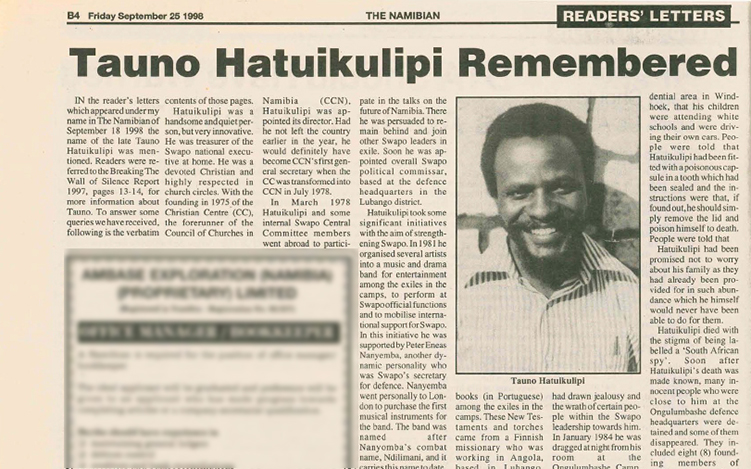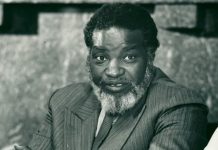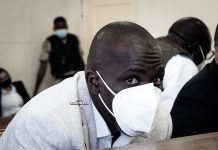While James Hatuikulipi’s reputation has been tainted by corruption allegations, his father Tauno’s legacy is the opposite.
Tauno, a church leader and a respected member of Swapo’s guerrilla wing, Plan, has a street named after him in Okuryangava in Windhoek.
Tauno died in exile in 1984. Some suspect he was tortured to death while in custody at Swapo’s notorious Lubango camp.
The death of his father remains a “sore point” for Hatuikulipi. Those close to him say he becomes emotional whenever the topic is brought up.
They said it is part of his life’s mission to repatriate his father’s remains from Angola
On 25 September 1998, The Namibian published a letter by Samson Ndeikwila, chairperson of Breaking the Wall of Silence – an organisation formed to represent people detained by Swapo in exile.
In the letter, titled Tauno Hatuikulipi Remembered, Ndeikwila described how Tauno left Namibia to join the struggle.
Here is the letter:
Tauno Hatuikulipi Remembered
In the reader’s letters which appeared under my name in The Namibian of 18 September 1998 the name of the late Tauno Hatuikulipi was mentioned. Readers were referred to the Breaking The Wall of Silence Report 1997, pages 13-14, for more information about Tauno.
To answer some queries we have received, the following is the verbatim contents of those pages.
Tauno Hatuikulipi was a handsome and quiet person, but very innovative.
He was treasurer of the Swapo national executive at home. He was a devoted Christian and highly respected in church circles. With the founding in 1975 of the Christian Centre (CC), the forerunner of the Council of Churches in Namibia (CCN), Hatuikulipi was appointed its director.
Had he not left the country earlier in the year, he would definitely have become CCN’s first general secretary when the Christian Centre was transformed into CCN in July 1978.
In March 1978 Hatuikulipi and some internal Swapo central committee members went abroad to participate in the talks on the future of Namibia.
There he was persuaded to remain behind and join other Swapo leaders in exile. Soon he was appointed overall Swapo political commissar, based at the defence headquarters in the Lubango district.
Hatuikulipi took some significant initiatives with the aim of strengthening Swapo.
In 1981 he organised several artists into a music and drama band for entertainment among the exiles in the camps, to perform at Swapo official functions and to mobilise international support for Swapo.
In this initiative he was supported by Peter Eneas Nanyemba, another dynamic personality who was Swapo’s secretary for defence.
Nanyemba went personally to London to purchase the first musical instruments for the band. The band was named after Nanyemba’s combat name. Ndilimani, and it carries this name to date.
Hatuikulipi spoke boldly articulating the people’s feelings against the 12 Points Order Circular of 1981. (see A Report to the Namibian People: Historical Account of the Swapo Spy drama, 1997, pp 14-15).
He argued that these orders would serve no other purpose except making Namibians kill and finish one another in exile. He also opposed the order that the Typhoon Unit should kill white farmers. He argued that such action would make Swapo look like a terrorist organisation, not a liberation movement.
In 1983 Hatuikulipi allowed for the distribution of New Testament books (in Portuguese) among the exiles in the camps.
These New Testaments and torches came from a Finnish missionary who was working in Angola, based in Lubango.
Hatuikulipi’s action was contrary to the campaign of some people in the Swapo leadership who were against the church and busy promoting the ideology of atheism.
As political commissar, Hatuikulipi influenced and assisted many young Namibians in the camps to go and further their studies in different countries.
This was seen as conflicting with the general conscription order, then officially known as “general mobilisation” of 1981. (sec A Report to the Namibian People: Historical Account of the Swapo Spy drama. I 997,pp 15).
The above-mentioned actions by Hatuikulipi had drawn jealousy and the wrath of certain people within the Swapo leadership towards him.
In January 1984, he was dragged at night in front of his room at the Ongulumbashe Camp, never to be seen again.
Hatuikulipi’s death was kept secret for six months. When it was revealed, people were told officially that he was a `South African spy’ who had infiltrated Swapo at the highest levels.
It was alleged that many Plan fighters had been killed in several ambushes because Hatuikulipi had been communicating information about their movements to the enemy.
It was further alleged that Swapo had discovered that millions of South African rand had been deposited in the accounts of Hatuikulipi’s family back home, that the family had a big farm plus a house in the white residential area in Windhoek, that his children were attending white schools and were driving their own cars.
People were told that Hatuikulipi had been fitted with a poisonous capsule in a tooth which had been sealed and the instructions were that, if found out, he should simply remove the lid and poison himself to death.
People were told that Hatuikulipi had been promised not to worry about his family as they had already been provided for in such abundance which he himself would never have been able to do for them.
Hatuikulipi died with the stigma of being labelled a ‘South African spy’. Soon after Hatuikulipi’s death was made known, many innocent people who were close to him at the Ongulumbashe defence headquarters were detained and some of them disappeared.
They included eight founding members of Ndilimani, three of whom disappeared. In the book “Their Blood Waters Our Freedom,” [by Sam Nujoma] The cause of Hatuikulipi’s death is given as bronchitis.
Many Swapo members believed the false stories that Hatuikulipi was a South African agent. His family has gone through the hell of humiliation, suspicion and rejection. A feeling of guilt and anguish still hovers over their every-day life till his name is cleared and given its rightful place in the pages of the liberation struggle.
Samson Ndeikwila: Chairperson of Breaking the Wall of Silence, an organisation formed to represent the voices of people detained by Swapo in exile.






